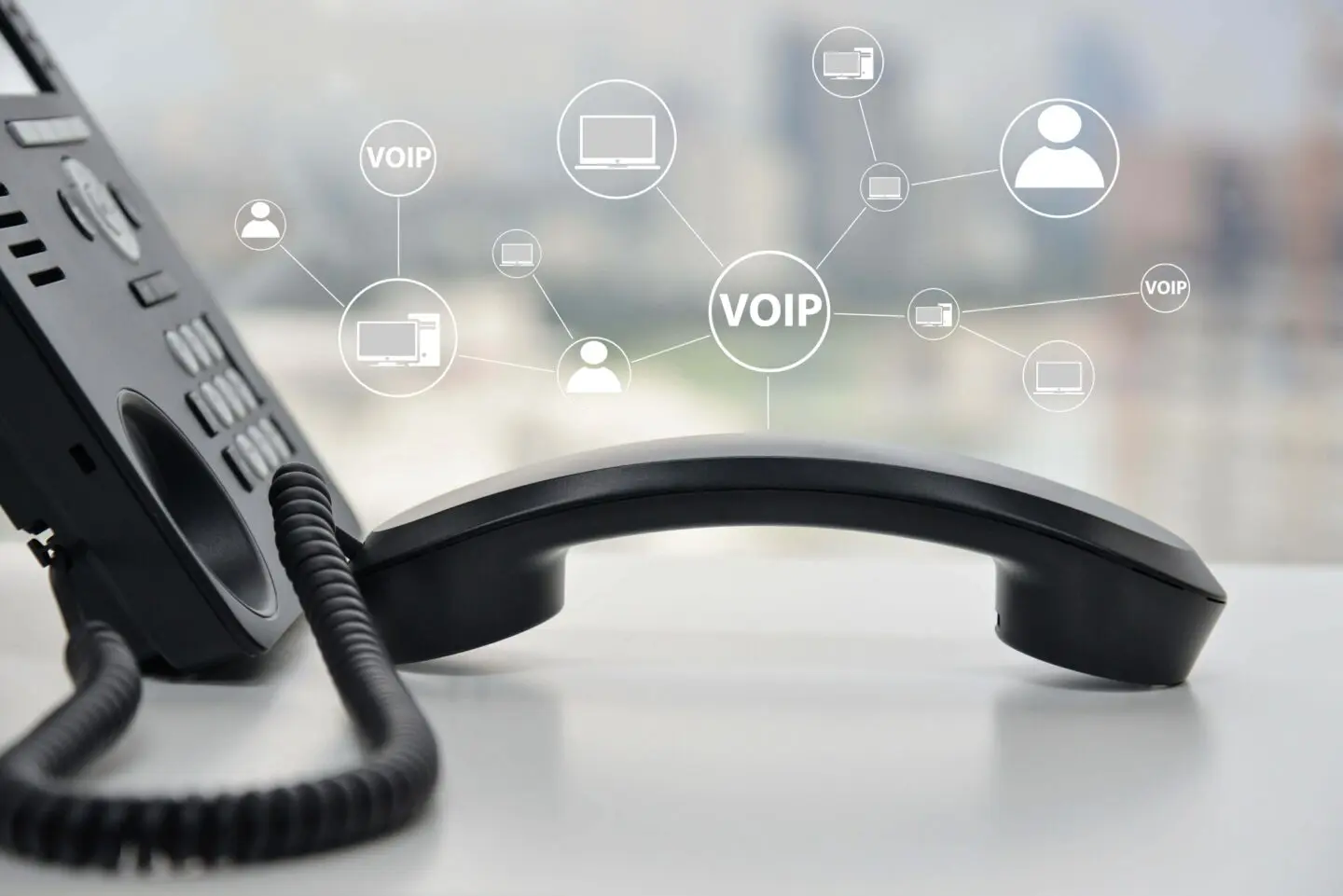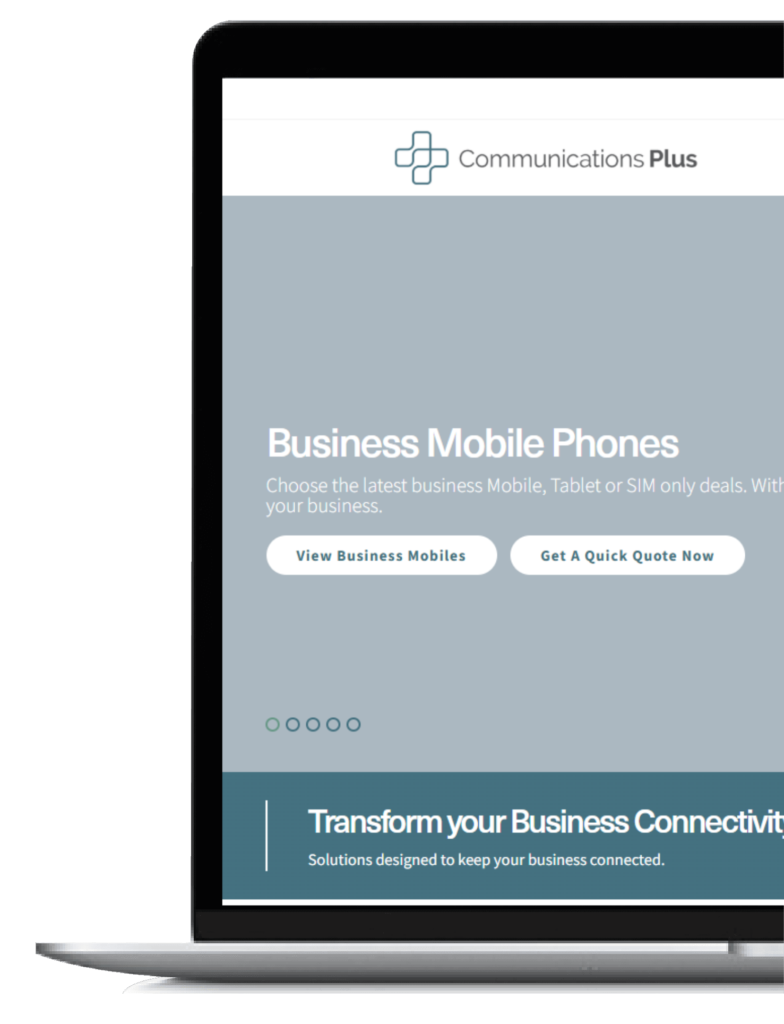VoIP telephone systems are far more effective than traditional fixed phone lines for any business looking for a varied, scalable and efficient communications system.
By putting all your voice, text and video conferencing into a single system (which can be run through one device), you can improve the productivity and effectiveness of your team and business and make significant cost savings.
And with the traditional PSDN lines due to be switched off in 2025, VoIP is set to be the predominant system used for phones.
But what is VoIP? What are the benefits? And what do you need to know about it?
That’s what we cover in this guide.
What is a VoIP phone system?
A Voice over Internet Protocol (VoIP) phone system is a technology that allows you to make all your voice, text and video calls from one device, using an internet connection instead of a regular PSTN phone line.
VoIP converts your calls into a digital signal, which is then sent over the internet to the recipient.
Because VoIP converts your analogue signal into a digital signal, it means you can carry out more data-reliant communications (like video conferencing) on one system alongside your voice and text messaging.
How does a VoIP phone system work?
A VoIP phone system allows you and your staff to make phone calls through your internet connection instead of a regular landline or a mobile network by converting analogue signals into a digital signal.
These types of calls can be made and received by any device with an internet connection, and don’t rely on a physical connection to a traditional copper wire phone line.
Because the calls work over the internet, it means you can send more data over the network without delays to service.
This makes it perfect for modern communication, which requires more data than simple voice calls.
VoIP also allows you to easily switch between voice, video and text calls with the click of a button.
For example, a tech support worker could answer a voice call and switch to a video call if it’s easier to walk the caller through fixing an issue.
Integrating VoIP calling into your business couldn’t be easier.
You can read this previous blog on how to integrate VoIP telephony into your business.
Why would you switch to a VoIP phone system?
There are many benefits to a VoIP phone system, including High-Definition voice quality and a vast number of features that can increase your business’s productivity.
By consolidating all your voice, text, data and video calling into a single system, VoIP is much easier to manage and makes your call handling more efficient.
In addition, every UK business will need to consider a VoIP telephone system before the PSTN switch off in 2025.
Today’s communication is much more reliant on data than when phone calls were exclusively made with an analogue system over a copper wire.
Digital communication requires much more data to be packaged and sent over a network, particularly when dealing with video conferencing technology or 5G.
What are the benefits of using a VoIP business phone system?
- Higher quality of calls.
Because VoIP uses a digital signal instead of the traditional analogue signal sent over a copper wire, it produces a much clearer, higher-quality call.
The principle is the same as that between the old analogue TV signals and digital signals.
Digital signals can carry much more data between callers, so don’t have the same performance problems as traditional lines.
- Cost savings
Businesses can pay a monthly all-inclusive fee for a VoIP phone, which includes the hardware, license and usually a package of free calls.
This is compared to the higher costs of buying handsets and having separate phone lines installed in your building for every device.
With VoIP, you simply connect the device to your network over the internet, so it’s much cheaper.
And while you could invest in dedicated VoIP handsets, they’re not necessary if you’d prefer to run your digital phone network over existing business mobiles or laptops.
- Superior software and hardware
VoIP handsets are far more advanced than traditional phones and can easily accept, make and switch between voice, video and text calls.
They also provide a more comprehensive range of call management options like call monitoring and recording, auto attendant, call routing and screening.
- Easier conference calls
Trying to conference call on traditional phones can be difficult, if not impossible.
Especially if you need to dial another person in after the call has started.
For most businesses, this means investing in separate video conferencing technology, with all the additional costs involved.
With a VoIP system, you can easily carry out voice or video conferencing on any internet-enabled device. Users can dial in to the conference number using either voice calling or video.
If you need to invite an additional person to the call, they can easily be added and dial in using either voice calling or video.
You can also switch between voice and video during the call.
This is becoming a much bigger consideration with more employees working out of the office.
- Portability
An issue businesses are having with more employees working remotely is how to ensure they’re still contactable by customers and the rest of the team.
Not all employees are comfortable giving their personal phone number away, and they also might not want to have a second business phone.
You’ve also got the issue of customers having too many phone numbers to choose from and not knowing which is the right one.
Ideally, you still want to have a single “main” business number that anyone can answer, regardless of where they’re working.
This is something you get with VoIP.
- Reliable service
Analogue phone systems can be susceptible to service drops for several reasons.
Whether it’s drops in signal, damage to copper wiring or even disruption due to bad weather.
These disruptions can be devastating when you’re trying to run a business.
And with communication relying on more data sent over the network, old phone lines can’t keep up.
VoIP solves this because calls and data are sent digitally over the internet, so anyone with a connection can have seamless access to their business’ phone service.
And with 5G providing an ever more reliable backup, we’re nearing the time of total coverage for internet-based communication.
- Scalable
One of the main downsides of relying on analogue ISDN lines is that establishing new lines can be time-consuming and costly.
You need to arrange for an engineer to install a new copper wire directly from the box outside into the building and then have this physically connected to a new handset you’ll need to buy.
This is highly inefficient and costly if you need to scale up quickly.
On the other side, if you have all these new lines installed and then need to scale down, you’ve got a lot of new phone lines running into the building that you no longer need.
With VoIP, you just add a new phone or licence to your existing connection when someone starts, and they’re ready to go in a few minutes.
If someone leaves, simply remove the licence from your package.
- Easy maintenance
Traditional phone lines can be costly to maintain, especially if it’s not clear where the problem is occurring on the line.
It usually requires at least one engineer to visit onsite and can have significant costs associated with identifying and fixing problems.
With VoIP, problems can usually be dealt with remotely because everything operates over the internet.
This means problems can be resolved much quicker, at a reduced cost.
How much does a VoIP phone system cost?
Depending on the nature of your business’s existing phone system, it can be costly to install additional phone lines.
It can easily be more than £100 per new line (The standard cost of a new BT Openreach line installation, for example is around £140).
Depending on the network, there could also be a cost for the technician visit when looking where to install the phone line and potentially an activation fee for your new lines.
You could end up with a bill of over £200 per new phone line, plus the costs of your new handsets – which can be up to another £100.
It’s much cheaper to set up your VoIP network because you’re only paying the cost of a licence per user (between £10 and £50 a month on average).
And while you can invest in specific VoIP handsets, you could just as easily install an app on your business mobiles and still get all the benefits of this digital system without the costs.
How to choose the best VoIP phone system
There is an ever-growing number of excellent VoIP phone systems available to businesses today.
One of the first considerations when looking at a VoIP phone system for your business is whether it’s a fully managed cloud-based service or a system you purchase and host yourself (either in your office or in your private cloud).
We’ve written more about the difference between Hosted VoIP and Private VoIP in this blog.
Most leading systems on the market are cloud-based services, such as Gamma Horizon.
3CX, which is a popular choice.
This gives businesses more freedom over how they’ll host their VoIP system and provides more flexibility on the device that can be used.
Invest in the right VoIP business phone system with Communications Plus
Whether you’re looking for a more managed VoIP phone system or want something more software based, you’ll find what you’re looking for at Communications Plus.
We offer managed Horizon VoIP phone systems, complete with hardware and licensing on a fixed monthly tariff, along with more software focussed VoIP solutions like those provided through 3CX.
If you’re looking to get ahead of the game with a new VoIP phone system ahead of the 2025 ISDN switch-off, get in touch to find out more about our VoIP systems, and they could benefit your business.










